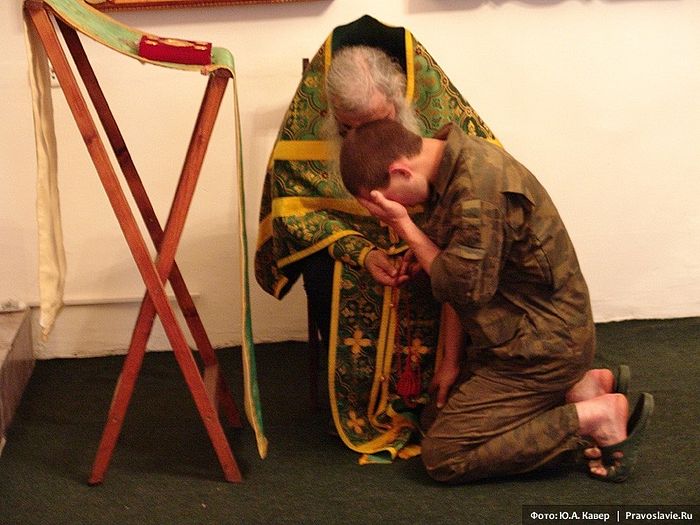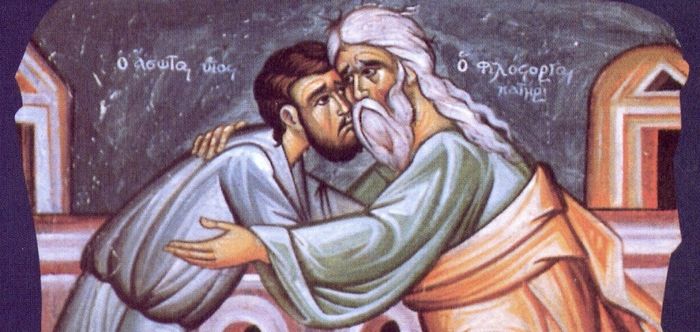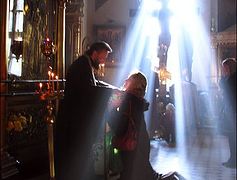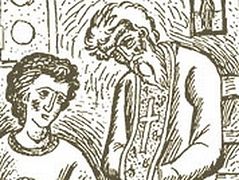As part of the special project “Mysteries of the Church” Archpriest Artemy Vladimirov is speaking about the essence and meaning of each of the seven Mysteries: Baptism, Chrismation, Repentance, Communion, the Mystery of Marriage, the Mystery of the Priesthood, and Unction.
Today our talk is on the Mystery of Repentance. Is it possible to be a Christian without repentance? What is the essence of confession? Who receives the confession and forgives the confessed sins? And how are we to answer those who claim that, “they will sort out their sins without a priest?”
It would appear that not only priests, not only monastic, but also married priests—that is, different pious Christians, always, if they live piously, confirming their faith by striving to fulfill the commandments, can give an account of their confession. And the first word, of course, should be the witness of repentance. After all, barely had Christ the Redeemer appeared to the world and entered upon His public ministry than He spoke for all ages, for all times, addressing Himself to all His rational creations, to every tribe and peoples without exception: Repent ye and believe the Gospel; Repent ye: for the kingdom of heaven is at hand. And the Apostles, true to the testament of their Teacher, proclaimed to every end and corner of the earth; and the priesthood continues the apostolic preaching even now—in Eurasia, Australia, America, Antarctica (where His Holiness the Patriarch was not long ago), in the Russian Far North—witnessing to the Mystery of Baptism received with repentance, that is, by a contrite confession of our feebleness and weakness and the revelation of involuntary sins, which we committed after our entrance into the regiment of Orthodox Christians out of ignorance and feebleness.
Repentance is the essential activity of the Christian, and literally fits within the little mustard seed of the publican’s prayer: God be merciful to me a sinner—the abridged Gospel, the expression of repentance, which is widely known to us as the Jesus Prayer: “Lord Jesus Christ, Son of God, have mercy on me a sinner.”
In what lies the essence of repentance? In standing daily and nightly, as is customary to angels and the slaves of God, before the invisible Face of our Savior, always aware of our infirmity, weakness, and unworthiness; to confess our depravity, along with wholly trusting in the omnipotence, goodness and mercy of the Creator. He is holy, and we are sinful. He is the sun of truth in which there is not even a single dark spot, and we are a clot of darkness: conceit, self-love, self-will. However, in this darkness there shines a light, and the darkness cannot conceal it. The light is Divine grace, the spark gifted to us in Baptism. And that the light may conquer the darkness, that truth may supplant falsehood, that goodness may conquer evil within us, but we must strain with every fiber of our soul and every cell of our body, striving towards the Creator with repentance—as a flower stretches towards the source of earthly light. In this way, by repentance is meant not only that minute when, entering under the vaults of an Orthodox church, we await our turn, we rise before the Cross and Gospel, and the priest, vested in cuffs and epitrachelion, having read the relevant prayers, as a doctor exhorts us to reveal that which is done in darkness; so that by the invisible touch of His healing right hand the Risen Jesus Christ, here standing, will touch the inflamed bleeding wound of the heart and in the blink of an eye in answer to this acknowledgement, this confession of evil thoughts, impure feelings, and actions, incompatible with the dignity of a Christian, we would be forgiven, cleansed, sanctified, gifted a Divine impetus, so that the spark of the Holy Spirit, communicated to us in the Sacrament of Baptism, would evolve into a flame of faith, hope and love.
I repeat: not only in the minute of confession of sins and receiving of forgiveness are we called to carry out the commandment of Christ: Repent ye and believe the Gospel; but before and after Confession the Christian is called to abide in repentance. Repentance is the air that pervades the soul; it is the light that allows us to see the path before us. Repentance is the aspiration to refrain from your confessed sins. It is a battle with sinister desires and passions that are no-nos, and which raise up their serpentine heads in the depths of our heart. Repentance is the desire to oppose these corrupt habits, with which we wrestle today by benevolent deeds, so that yesterday’s satiety becomes today’s abstinence; the day before yesterday’s lie gives way to words of truth and verity; fear and lack of faith, doubts and cowardice are lost in oblivion, replaced by shoots of courage, determination, vigor, and the life-giving energy of patience, without which, as without difficulty, we can’t reel a fish in from the pond.
An essential link in this golden chain of repentant works is, of course, the confession of sin. But Chekhovian semi-intellectuals will ask a priest with irony, “And why do I need some priest as a mediating authority? Isn’t it enough for me to have a personal relationship with the Creator? What is the Mystery of Confession for? What? Is batiushka sinless or something that he can forgive my sins?” We, pastors, having heard such questions, always smile in response: “My dear, you are completely correct. So without any priest, having risen in the morning from sleep or going to bed after a toilsome day, recall your sins: vanity, suspiciousness, resentment, irritability, impure thoughts, the awful habit of watching such things on TV unbefitting of the appellation of ‘homo sapiens.’ Rational man, repent of your sins. But remember, dear friend, that you will never be able to forgive yourself. You will never be able by force of will to place into your heart childlike purity, the joy of being, to soothe your heart—here is necessary an external injection through our sanctification by the authority of the priesthood. It is just as no one can perform a cavernous surgery on himself, but sometimes demands anesthesia, so as not to be a witness to his own blood. Thank God, confession happens in a sound mind and clear memory—it has nothing in common with brainwashing or hypnosis. A man proceeds to the Cross and Gospel, piously believing that the Lord, with outstretched arms awaits him here, and the Blood of our Savior pouring out from His pierced side and wounds on his hands and feet washes his blackened and burnt conscience. The priest is only a participant, a witness to repentance; but the doctor, resurrecting the soul and cleansing the body, is the Omnipotent Lord Himself in the flesh.” This is why it’s necessary to confess, and the sooner the better. I hope that all half million in our audience, who have not been to confession for a hundred years now, will immediately run to church—the time is short. We won’t tempt the Creator’s longsuffering.
We should confess clearly and precisely, trying to completely flee self-justification, not alluding to extenuating circumstances, not whitewashing our sins. We should strike the serpent in the head: I have sinned, O Lord! You can turn not to the priest but to the very Lord Jesus Christ standing before you. “I have sinned by gluttony, lust of the heart, despondency and grief, repeated sins, spiritual and bodily impurity, and other forgotten sins. I confess, Lord, but help me to amend my ways and live in an Orthodox manner. I am weak and feeble, although I firmly and undoubtedly believe that You, my merciful Creator, cleanse and pardon and save me.” The priest, if he is an attentive pastor, can help you by your questions to peer deeper into the confines of your own soul, because the Lord Himself gives priests the wisdom and strength to facilitate this neurosurgical activity. Every time, with the participation of our committed confession, we priests are amazed and astonished and even marvel at the grace of God. Because a miserable man comes, as if he is pressed down by sins, as if there is a very heavy basket on his shoulders; and behold, sincerely, confessing with a contrite heart, he will just barely rise from his knees upon receiving the prayer of absolution and kiss the Cross and Gospel as a sign of his determination to die, yet not freely commit deadly sins—the coarsest and most disgusting: theft, profanity, fornication and so on and so on. We are surprised by this metamorphosis, which occurs before our eyes: a clear brow, the sparkle in his eyes, a bright smile, and most importantly—in the heart, that spoken of by the Russian poet: “When you believe and cry you feel light …”[1] Confession in this sense is the only true and moral medicine for modern man. And it’s not surprising to us priests that others complaining about feelings of melancholy, of what is called depression, burrowing evil thoughts, blasphemous and bitter thoughts, sometimes suicidal demonic provocations—demonic thoughts—just barely disclose the heart to the Divine eye. However the Lord is not in need of our confession, but rather we are in need of it. And these people immediately feel alleviation. Why? Because the devil, who is always near to weak and sinful man, instantly runs away, his dark and wicked deeds only scarcely having been denounced.
It is only through repentance that a Christian learns to humble himself before the Omnipotent God. It is only by confessing that he recognizes the grace of the Lord, expressing itself in the words, “I desire not the death of the sinner, but that he might turn and live.” There is no such sin that would conquer the mercy of God. Therefore, dear friends, we await your repentance—and may deep-flowing rivers of Divine grace tap and irrigate your thirsting soul. And we, God-willing, will meet again—and not only once or twice before the Fearful Judgment.






